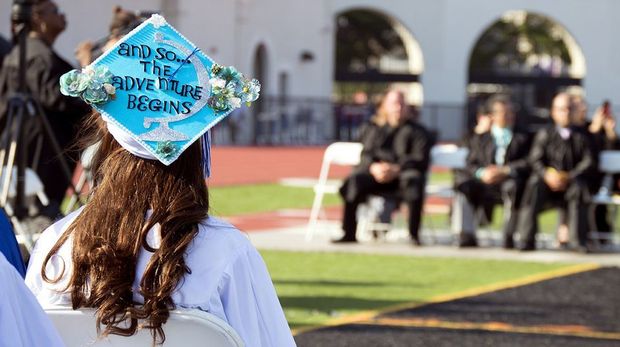
by Chanel L. Donaldson | Jul 30, 2018 | News1
New report from the Newark City of Learning Collaborative and Rutgers University-Newark’s School of Public Affairs and Administration highlights college-going trends
(Newark, NJ — July 30, 2018 ) Today, the Newark City of Learning Collaborative (NCLC) released Post-Secondary Outcomes of Newark High School Graduates, an analysis of what college-going looks like for nearly 13,500 of Newark’s recent graduates. Housed at the Joseph C. Cornwall Center for Metropolitan Studies, NCLC is working to build Newark’s college-going culture by ensuring that all Newarkers have the tools and resources needed to get to and through college. The report was produced in collaboration with the Rutgers University-Newark School of Public Affairs and Administration.
Covering approximately 85 percent of all Newark high school students who graduated between 2011 and 2016, the report examines college enrollment, persistence, and completion rates.
“The good news is that we know more Newark students are enrolling in college, but we also know that far too few are persisting to degree completion,” says NCLC Executive Director Reginald Lewis. “We hope that this report will serve as a resource to better understand the experiences of recent high school graduates.”
Post-Secondary Outcomes is truly groundbreaking because it is representative of graduates from traditional public, charter, vocational technical, and private schools. The report is the first of its kind, involving the participation of representatives from all of Newark’s school sectors.
“The cross-sector collaboration was one of the highlights of the project and enabled us to examine college-going for a wide range of Newark high school graduates. One of our goals was really to put schools in conversation – not competition – with one another to learn and share best practices throughout the community,” remarks the report’s co-author Dr. Kristi Donaldson.
Newark Public Schools currently enrolls over 60% of all Newark high school students. Newly appointed Superintendent Roger León has already demonstrated interest in collaboration and making college-going and college persistence a priority for NPS students. “I would like to thank Rutgers–Newark, the Newark City of Learning Collaborative, and SPAA for capturing this important data on Newark Public Schools high school graduates over the span of the last six years,” said Superintendent León. “While these numbers represent improvement over previous years, they remain far from where we should be. Our goal in Newark and my commitment is to propel students in an upward trajectory. Our students can soar academically and can compete nationally.”
Ryan Hill, founder and CEO of KIPP New Jersey, noted “the academic rigor of our K-12 education and the support we give our alumni and their families as they navigate their lives after high school have been critically important in helping our kids close the college opportunity gap and reach their potential.” Hill also highlighted the importance of “collectively work[ing] to expand college opportunities for Newark students.” In fact, KIPP recently supported a group of Newark Public School guidance counselors to attend their College Counseling Institute in San Antonio, TX, indicating greater interest in working together.[1]
With an increasingly large share of Newark students enrolled, Essex County Schools of Technology (formerly Essex County Vocational Technical Schools or ECVTS), made up the second largest subset of students in the study. Superintendent Dr. James M. Pedersen commented on the importance of Post-Secondary Outcomes by saying, “As we continue to improve our practices in preparing students to be successful in college and in the area of career-technical education, the findings and recommendations of this report will help us shape programs that hold students to high academic standards and spur better outcomes for them.”
As the only private school involved, St. Benedict’s Prep’s Headmaster Fr. Edwin Leahy noted his enthusiasm in taking part in the project adding, “We are eager to share what experience has taught us about not only getting young men into college, but also playing a role in supporting them through it … [and] learning from the other participating high schools as we continue our work to ensure that an even greater number of our graduates receive their college degrees within four or six years of leaving us.”
Ultimately, the findings of Post-Secondary Outcomes will help school leaders, educators, parents, and policymakers from across the city evaluate and strengthen the high school to college transition.
“This can help the city to make informed policy decisions to ensure as many young people as possible succeed at the college level,” says Lewis.
Community roundtables in each of Newark’s five wards are scheduled to take place this fall, beginning with a press launch at Newark City Hall in September.
To download the full report, click here.
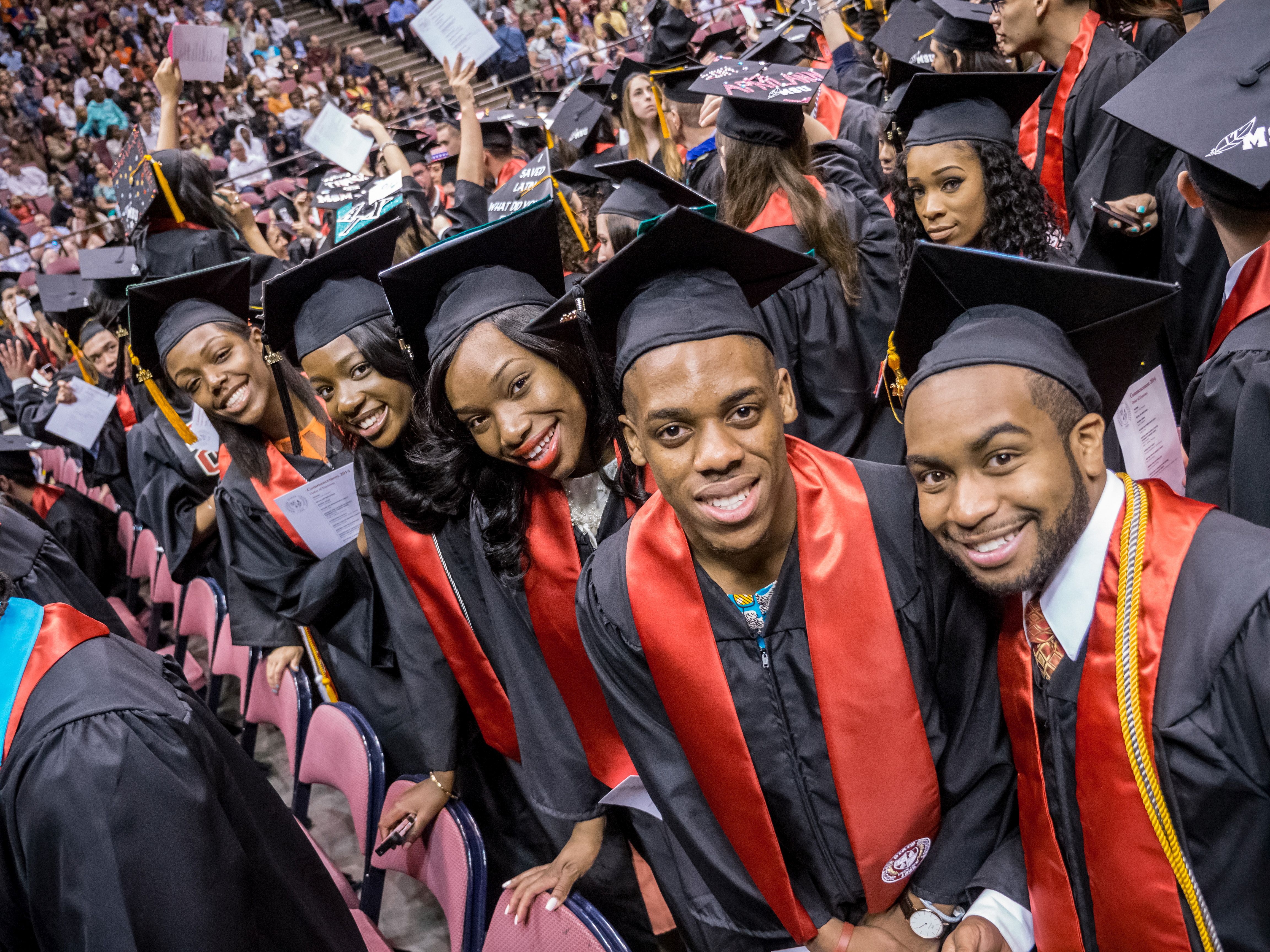
by Chanel L. Donaldson | Jun 29, 2018 | News1
This summer, the Newark City of Learning Collaborative (NCLC) is releasing Post-Secondary Outcomes of Newark High School Graduates, an analysis of what college-going looks like for 13,500 of Newark’s recent graduates. NCLC, which is working to build Newark’s college-going culture by ensuring that all Newarkers have the tools and resources needed to get to and through college, produced the report in collaboration with the Rutgers University-Newark School of Public Affairs and Administration. Covering approximately 85 percent of all Newark high school students who graduated between 2011 and 2016, the report examines college enrollment, persistence, and completion rates for graduates from traditional public, charter, vocational technical, and parochial schools. The findings will help school leaders, educators, parents, and policymakers evaluate and strengthen the high school to college transition so that as many Newark students as possible can succeed in college.
While overall college enrollment has increased for Newark high school graduates, it has declined for some graduates.
Almost two-thirds of Newark students enrolled in college after high school graduation, but over the study period, enrollment declined by close to four percent among graduates of comprehensive high schools. Unlike magnet schools, comprehensive public high schools have historically served some of Newark’s neediest students. More support is necessary to get the college enrollment rate up for graduates of comprehensive high schools.
More Newark high school graduates are going to four-year institutions.
Enrollment has increased at four-year colleges and universities for Newark high school graduates. The most commonly attended four-year institutions include Rutgers University-Newark, Kean University, Bloomfield College, and Montclair State University.
Persistence at two-year colleges is lower for Newark high school graduates than it is at four-year colleges.
Overall, nearly two-thirds of students persisted through their second year, meaning that most students returned to school after their freshman year. Persistence is a critical measure because if students persist from their first year to their second year, they are more likely to go on to complete their degree. However, persistence was substantially lower at two-year colleges, a problem that affects the approximately 28 percent of Newark high school graduates who start college at a two-year institution. Additional supports will help students who enroll at a two-year institution continue toward graduation or transfer to a four-year institution to earn a bachelor’s degree.
Not enough Newark high school graduates are earning a college degree within six years.
Only 23 percent of high school graduates earned a college degree within six years, the time frame commonly used to assess completion time for a bachelor’s degree. Merely helping students get into college is not enough to guarantee their success. Additional attention is needed to ensure students are staying enrolled in college and actually earning their desired degree or credential.
Ward-based roundtables to generate conversation and brainstorm solutions around these findings will take place in fall 2018. Engaging the community about how to best support Newark students to and through college is the ultimate goal.
To read the full report and view the schedule of upcoming roundtables, visit newarknclc.org.
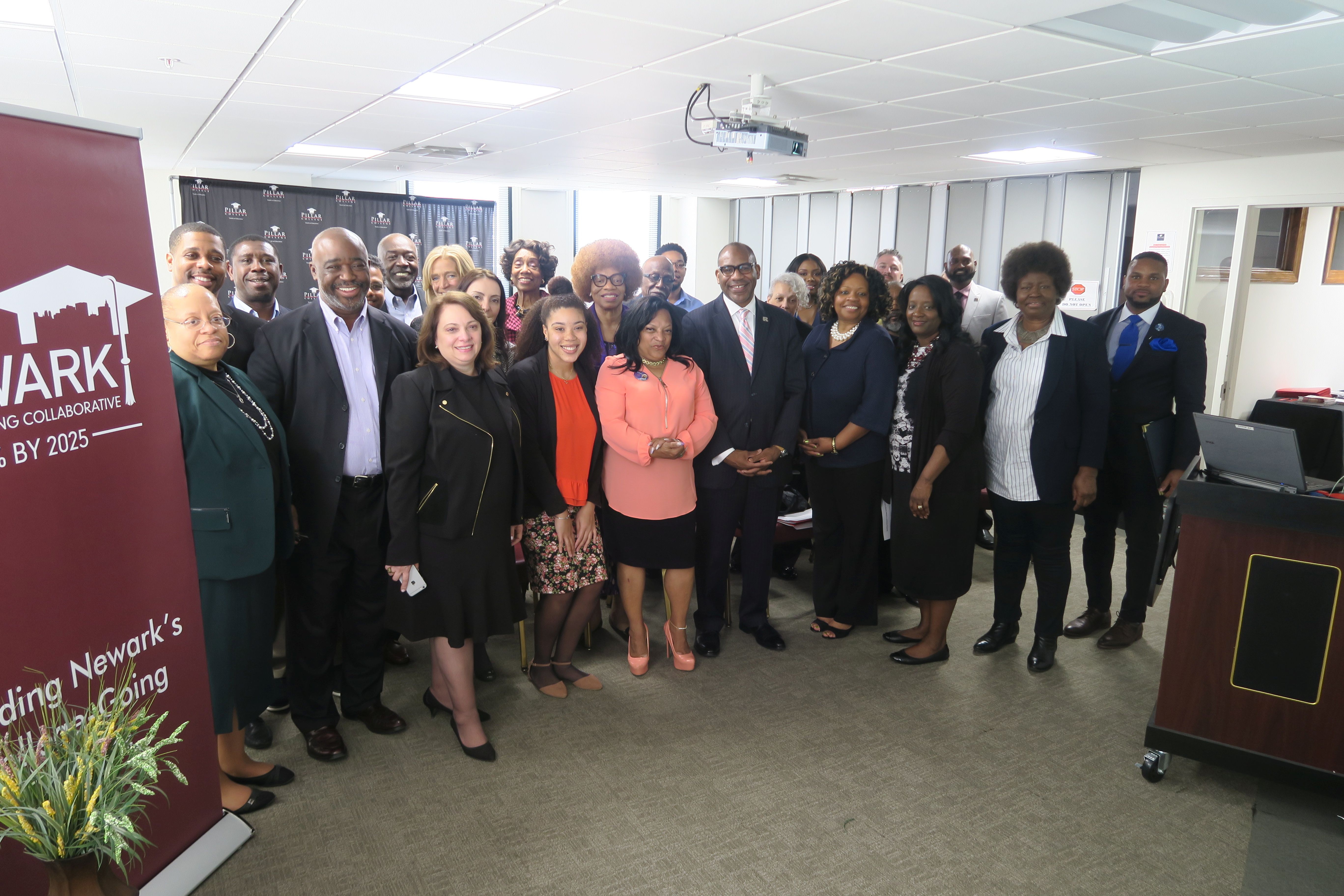
by Chanel L. Donaldson | May 9, 2018 | News1
On Thursday, April 26, 2018, the Newark City of Learning Collaborative (NCLC) gathered clergy members at Pillar College for the Inaugural Interfaith College Seminar: Exploring Newark’s College-Going Culture. The half-day seminar, which was co-sponsored by the City of Newark, The Positive Community Magazine, and Pillar College, introduced faith leaders from various Christian denominations and the Muslim community to the citywide mission of building Newark’s college-going culture.
Housed at Rutgers University-Newark’s Cornwall Center for Metropolitan Studies, NCLC is working to ensure that all Newark residents have the opportunity, information, and access to go to college, afford college, complete college, and ultimately obtain good jobs. During the Seminar, clergy received resources to bring back to their communities, including supports available for high school students and adult learners, as well as information for financing a college education. NCLC’s higher education partners NJIT, Berkeley College, Pillar College, Rutgers University-Newark, and Essex County College were among those present to provide resources and answer questions.
At the close of the Seminar, representatives from each house of worship took a pledge to serve as an NCLC ambassador, bringing tools for college success to their community and sharing the mission of NCLC widely. NCLC and its co-sponsors look forward to future events to further engage Newark’s interfaith community and continue to reach more Newark residents.
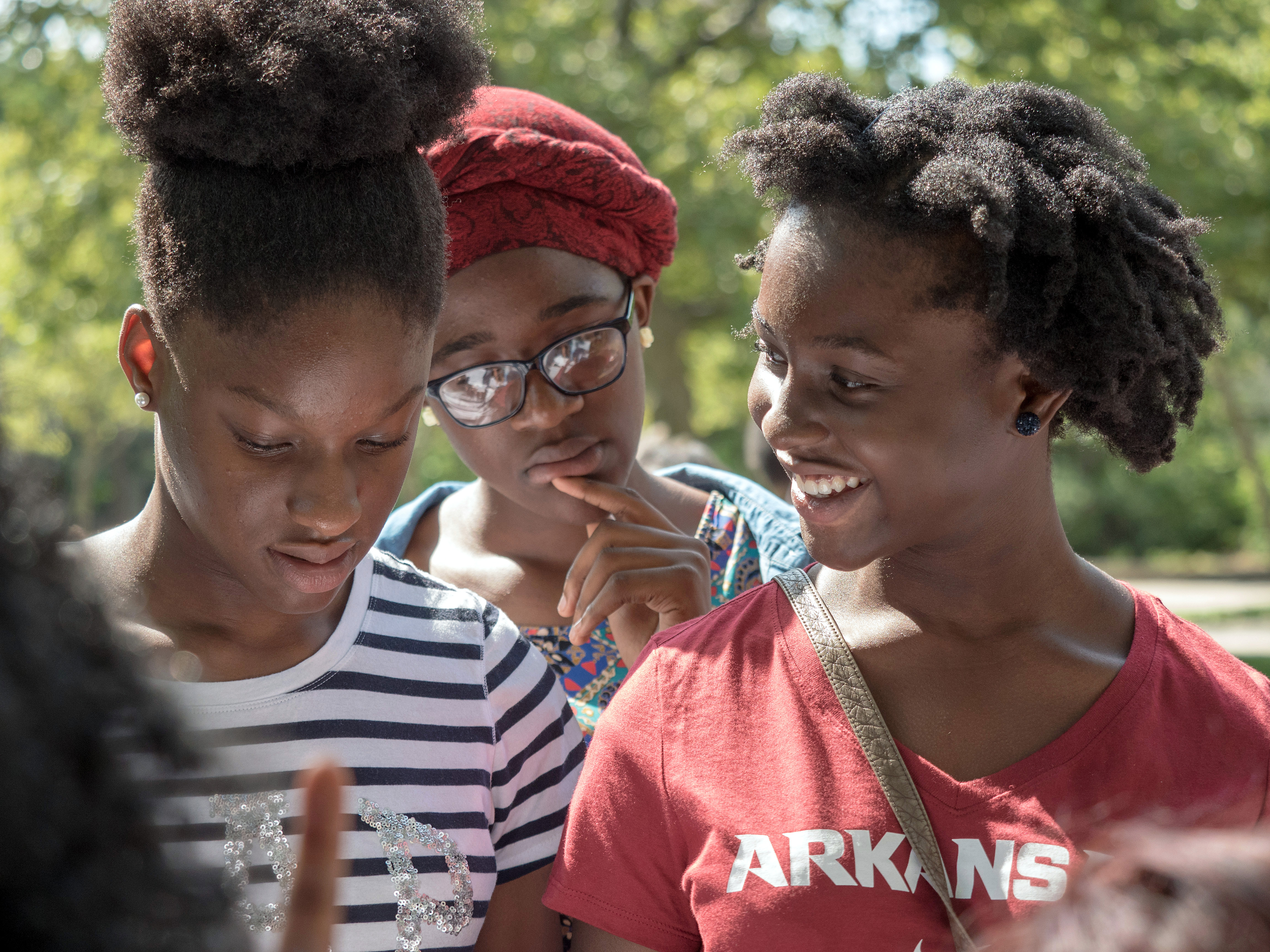
by Chanel L. Donaldson | Apr 12, 2018 | News1
Newark is on the rise in more ways than one. Most people know about recent investments to re-energize the economy – like the Hahne’s Building which houses a new Whole Foods. But there is also a movement across the city to invest in residents, ensuring that Newarkers have every chance to take advantage of new opportunities.
Leading the charge for a more educated workforce is the Newark City of Learning Collaborative (NCLC). Housed at the Cornwall Center at Rutgers University-Newark, NCLC is a partnership of stakeholders moving the city toward higher educational attainment. Central to this goal is developing a college-going culture in all K-12 schools, so that every student has the same opportunity, information, and access to pursue a post-high school degree or credential.
NCLC focuses much of its effort to build a college-going culture at schools like West Side High School, which is considered a comprehensive or neighborhood high school. Unlike magnet schools that have historically served more academically proficient students, comprehensives have often struggled to serve some of Newark’s neediest students. Despite its challenges, all of West Side’s faculty and staff are committed to improving student outcomes and establishing a climate of achievement.
Through partnership with Principal Larry Ramkissoon, guidance counselors, the MCJ Amelior Foundation, and arts partners, NCLC’s efforts at West Side help support areas fundamental to a college-going school culture:
- Application Days: Hosted for the first time in January 2018, dedicated time during three consecutive school days allowed seniors to submit college applications, write personal statements, and submit the FAFSA (Free Application for Federal Student Aid) with one-on-one guidance from local college admissions representatives and volunteers.
- SAT Prep Course: Building on an existing partnership between Newark Public Schools and The College Board to provide a free in-school SAT exam to all juniors on April 10, 2018, NCLC is preparing a group of 50 students at West Side High School for this opportunity. The intensive 8-week long program takes place on Saturdays in the school building, and instruction is provided free of charge by The Princeton Review.
- Poetic Justice Residency: Research shows that engagement in arts education is related to higher academic achievement. An NJPAC artist helps students use poetry to explore current events, personal development, educational access, and other issues in the community. Students engaged in the Residency also participate in NCLC Saturday programming through Pathways to Achievement and Success, which integrates arts education with college preparation.
As NCLC continues to grow, the goal is that the type of work happening at West Side will extend to every school in the city, ultimately sustaining a city wide college-going culture. While economic re-investment is important, bolstering the capacity of all youth to succeed is crucial for Newark’s future.
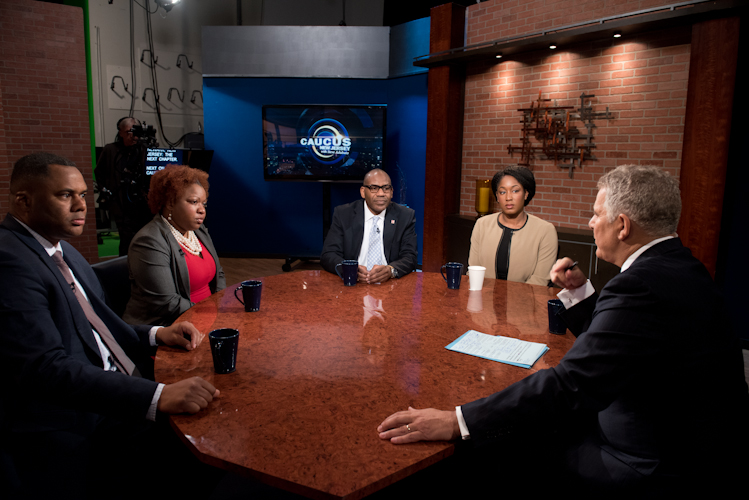
by Chanel L. Donaldson | Jan 3, 2018 | News1, Video
Newark, NJ: Improving the Lives of Inner City Youth
Steve Adubato sits down with community leaders in the greater Newark area who are working to improve the lives of inner-city youth by providing access to quality after school programs, improved educational opportunities, and job/college readiness initiatives. This panel also addresses the ways young people can get back on track after an adverse experience with the law with help from the community. Guests include Ryan Haygood, Esq., President and CEO of NJ Institute for Social Justice; Mekaelia Davis, Program Officer at Prudential Foundation; Traymanesha Moore-Lamy, Ph.D., Executive Director of Newark Thrives! and Reginald Lewis, Executive Director of Newark City of Learning Collaborative. The episode aired on Saturday, December 23, 2017 on NJTV.
View the episode here: http://steveadubato.org/newark-nj-improving-the-lives-of-inner-city-youth.html
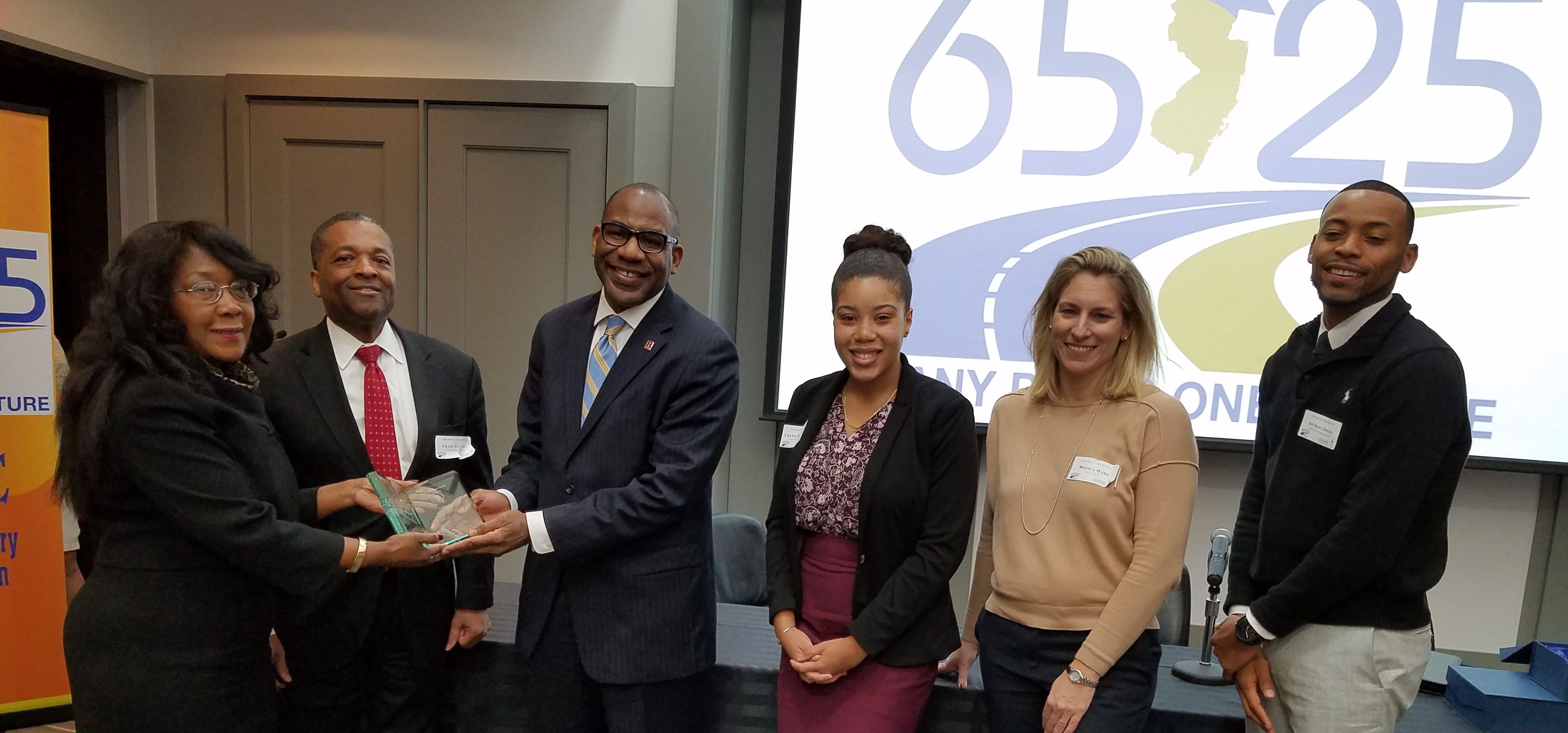
by Chanel L. Donaldson | Nov 29, 2017 | News1
Stakeholders from around the state joined the New Jersey Secretary of Higher Education, Rochelle Hendricks, on Monday, November 20, 2017 in Princeton for “65 by 25: Many Paths, One Future – The Equity Imperative,” during which the Newark City of Learning Collaborative (NCLC) received one of four Equity Trailblazer Awards. Presented “in recognition of innovative, exemplary efforts toward achieving New Jersey’s attainment goal,” awards were also presented to the Garden State LSAMP (Louis Stokes Alliance for Minority Participation) housed at Rutgers University-Newark, Gateway to College at Camden County College, and the Rowan College at Gloucester County Work and Learn Consortium.
The Equity Imperative event was hosted by the Secretary of Higher Education in partnership with Aaron R. Fichtner, Commissioner of the New Jersey Department of Labor and Workforce Development, and New Jersey Department of Education Commissioner Kimberley Harrington, as a part of the state’s 65 by 25 campaign which officially launched in September 2017. With a goal of raising the percentage of New Jersey residents that have a post-secondary credential from the current 50 percent to 65 percent by 2025, the initiative is “helping to ensure an innovative, competitive, inclusive and prosperous future” for New Jersey and promoting collaboration between colleges and universities, businesses, and government officials.
In line with the mission and goals of the state, NCLC, which is housed on the Rutgers University-Newark campus, was launched in 2015 to help Newark become a more economically vibrant city by increasing the number of residents that have education or training beyond high school to 25 percent by 2025. Also like the state-wide initiative, NCLC works with a cross-section of stakeholders from higher education, K-12 schools, corporations, city government, foundations, and non-profit organizations to expand Newark’s college-going culture and develop clear pathways for residents to earn degrees or other credentials.
In attendance to accept the Equity Trailblazer Award on behalf of NCLC was Executive Director Reginald Lewis, who said during his remarks, “In just a few short years, we’ve managed to mobilize an entire city to begin to change a mindset in earnest about what’s possible: that many more residents can aspire to attain college and other post-secondary credentials…which gives us hope that 25 by 2025 remains in reach.”
Acknowledging the many partnerships that make the work of NCLC possible, Mr. Lewis highlighted the main take away for the event: collaboration is key to help make New Jersey a stronger and more equitable state.






